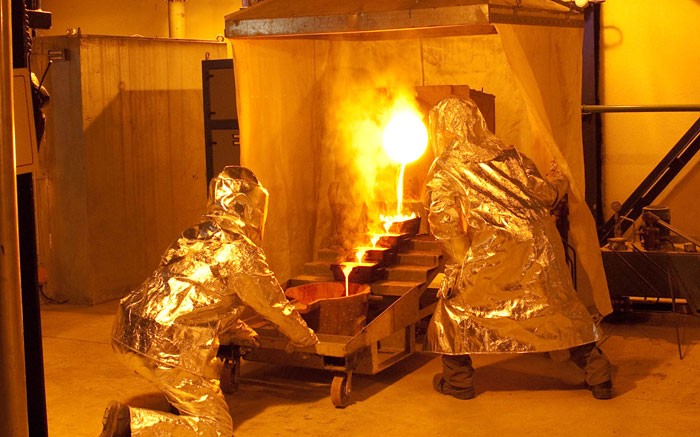Last year marked the second year of production at Nevsun Resources (NSU-T, NSU-N) 60%-owned Bisha mine in Eritrea and already its balance sheet is the envy of many companies in the industry.
Nevsun ended 2012 with US$396 million in cash and no debt after posting record revenues of US$566 million and cash costs of US$312 per oz. gold sold, inclusive of royalties. Cash flow from operations at Bisha reached US$194 million and the company handed out US$20 million in dividends.
The Bisha mine produced 313,000 oz. gold on a 100% basis last year, down from 379,000 oz. gold in 2011. By the middle of 2013, Nevsun expects Bisha to transition from its gold-silver oxide zone to its copper-rich supergene zone. (The polymetallic mine will transition to a zinc-rich zone from the fifth year onwards.)
In the first half of 2013 Nevsun expects Bisha will churn out 80,000 – 90,000 oz. gold (100% basis) and in the second half of the year 60 million lbs. of copper in concentrate. After fully ramping up, copper production should grow to about 200 million lbs. in 2014.
Nevsun invested US$64 million in the copper phase expansion in 2012 and a further US$24 million between sustaining capital for the facilities and exploration and evaluation expenditures. As of the end of Dec. 2012 the company had about US$28 million remaining to be spent on the copper plant start-up and RBC Capital Markets analyst Patrick Morton believes that money is expected to come from operating cash flow in the first half of the year.
Even with the transition from gold to copper this year, CIBC’s Cosmos Chiu says the company “will continue to accumulate cash, which could top about US$500 million by year-end 2013.”
“In a mining industry where cash is increasingly scarce Nevsun certainly stands out,” he writes in a research note, adding that with “one of the highest dividend yields in the industry, Nevsun has indicated that it continues to actively evaluate potential acquisition opportunities.”
Morton of RBC forecast in a Feb. 25 note to clients that an acquisition, “likely of a mid-size, feasibility-stage gold or copper asset, could be announced over the next two quarters” and says he thinks the company would be looking in West Africa and the Americas. “Assuming a reasonable price,” he argues, “an acquisition would be welcome in order to diversify Nevsun’s perceived single-country risk in Eritrea.”
In addition to deploying its US$396 million on possible acquisitions, Nevsun has also budgeted US$9 million for exploration this year that will be spread across 18,400 metres of drilling, data evaluation and resource estimation and has identified a number of targets that have yet to be tested near the mine.
Nevsun expects to drill about 14,000 metres in the northwest zone, about 1.2 km northwest of the Bisha mine, and about 2,000 metres at Hambok, 16 km to the southwest.
The remaining 2,400 metres will test high priority targets in the immediate Bisha mine area. “Many of these targets are immediately along strike of Bisha and have the potential to provide near-term new resources for existing operations,” analysts Cliff Hale-Sanders and Rajbir Gill of Cormark Securities write in a research note.
Hale-Sanders and Gill forecast that as the company transitions Bisha from a gold producer to a polymetallic producer there will be some risk in the short term “as investors adjust” but argue that this “could create good buying opportunities.”
“With gold investors continuing to churn out of the name, we see this as an opportune time to buy as Nevsun continues to look cheap relative to its peer group,” they note.
Of course it hasn’t all been smooth sailing. In February 2012 Nevsun cut its gold oxide reserve estimate by 28% due to a recalculation and its shares plunged by about 60% before regaining some ground. The company reviewed and re-estimated its entire resource base and now Morton of RBC says he is “relatively comfortable the new estimate is accurate, especially because the remaining resource is based mostly on the supergene and primary sulphide base-metal ore bodies, which are generally more homogenous than the gold cap.”
At presstime in Toronto Nevsun was trading at $3.86 per share within a 52-week range of $2.71-4.86. The company has about 199 million shares outstanding.


Be the first to comment on "Nevsun Resources and its heaps of cash"